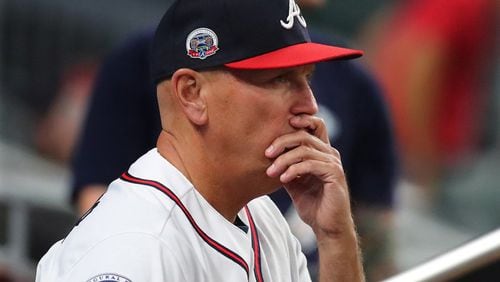Braves manager Brian Snitker has spent 41 of his 61 years on earth working for one organization, and right now the genial, loyal baseball lifer doesn’t know if he’ll be back with the Braves next season, and if so, in what capacity.
Some would characterize it as twisting in the wind, but Snitker insisted it wasn’t uncomfortable knowing the Braves hold an option on his contract for next season and haven’t told him if they’ll pick it up or decline it and replace him as manager.
“I’ve been doing that my whole life, really, when you get right down to it,” said Snitker, who spent four years as a Braves minor league catcher and has worked since then as a coach or manager, including 19 seasons as a minor league manager. “There probably were only a couple of times in my career where I had two-year deals. I don’t dwell on stuff like that. I just come and do the best I can today, that’s what I’ve always done.
“Teams I’ve had over the years, it’s just like (he told them), the only thing you can control is today. You can’t control yesterday, and tomorrow’s, like, light years away. So we just come to work today and prepare and do the best we can to win the game today.”
The Braves will be in the fourth season of their rebuild in 2018 and should be better just from the experience that many of their young players got this season, along with the expected arrival of other top prospects led by phenom outfield prospect Ronald Acuna. They could be significantly improved if a few young pitchers and players develop as hoped and particularly if the team adds at least one or two impact players via trade or free agency.
“It’s going to get better,” Snitker said, “because the guys are going to have another year under their belt; some of the guys aren’t going to have a year under their belt, they’re going to have games under their belt. So they’re going to start the next year with a good core group that’s not going to be awed. They’re going to have an idea of what they’re getting into.”
And make no mistake, Snitker isn’t ambivalent about coming back. He wants to keep the job.
“Yeah, I’d love to be here,” he said. “I want to be here. So, we’ll see.”
Asked what it felt like to know the team should be better and that he might not be around to manage it, Snitker said, “If I worried about that too much I’d drive myself crazy, so I don’t let myself do it. I just worry about today.”
It’ll be their second season at SunTrust Park, and the Braves know they need to snap their streak of four consecutive sub-.500 seasons if they hope to keep attendance at a suitable level coming off the increase they saw this year in the inaugural season at the ballpark. If they decide they would be better served by a change in manager, they’ll decline Snitker’s option and start the season with their second new manager in less than two years.
Picking up Snitker’s option looked like a near-certainty when the Braves went on a midseason run to get their record to 45-45 after sweeping Arizona in the first game following the All-Star break. But they were 23-38 since then, the worst record in the National League over that span, before Friday.
Snitker’s bullpen management has raised eyebrows at times, and some veterans have been hurt or underperformed even as others have met or surpassed expectations. Several high-profile rookies have made encouraging strides and big contributions. Snitker continues to have the support of his players, who have kept playing hard even if the pitching staff has struggled for much of the second half and the offense has been inconsistent.
The Braves have until five days after the World Series to decide on Snitker’s option, but team decision-makers aren’t believed to have a firm timetable for making the decision — it could be soon after the season or not until after the postseason, or somewhere in-between, though Major League Baseball generally prefers that such announcements not be made during the playoffs.
The Braves interviewed Bud Black, Ron Washington and in-house candidates Terry Pendleton and Eddie Perez for the managerial job last offseason before deciding to stick with Snitker, who had overwhelming support from his players, many of whom let the front office know their preference. Standout first baseman Freddie Freeman, the franchise player, has again voiced his support recently for Snitker to retain the job.
Black took the Colorado managerial job after the Brave hired Snitker, Washington decided to take the Braves’ offer to be third-base coach, and Pendleton and Perez continued in their roles as bench coach and first-base coach, respectively. All except Black would be candidates for the Braves managerial job again this time around if the Braves decide to move on from Snitker.
A likely candidate from outside the organization would be longtime former Twins manager Ron Gardenhire, currently serving as Diamondbacks bench coach. Another possibility, if the Braves decided to go bold, could be former Braves infielder and current MLB Network personality Mark DeRosa, who lives in Suwanee but has no coaching experience.
Even if Snitker were not brought back as manager, it’s expected he would be offered another position in the organization. He was asked if he could see himself going to another organization.
“No, not really,” he said. “I mean, this has been my life. This organization, I’ve been here the majority of my life. I’ve been with the Atlanta Braves. So yeah, it’s hard to think about being somewhere else.”
He’ll turn 62 in October, but Snitker has no plans to retire.
“No, I feel good,” he said. “It’s a job you really like, why would you want to retire? You’re outside, you’re with young people, you’re active. Shoot, this is a great way to make a living. I mean, I don’t know what I’d do if I retired. I get out on the golf course and after five or six holes I start thinking about everything else I should be doing.
“Like I say, better than retirement is working. Because it’s fun to be at a ballpark, to be with young guys, active and outside. Get to travel around. It’s a great way (to make a living). It’s better than retirement. You get winters off. In Georgia, November, December are some of the prettiest times of the year. You can do whatever you want, travel, play with the grandkids. It’s a fun way to make a living.”
About the Author






